 Hello! With the explosion of the gin market, people soon realised that Britvic is gross. While Schweppes is fine, it doesn’t have the nuances to pick out the flavours that make gins unique and enhance it. So luckily, lots of people have really upped their game. I’m taste testing nine tonics to see which is best. Well, that’s a very bold statement. Obviously tonics are catered for different flavours so really I’m going to drink a lot of gin and tonic in the name of research to see which tonic makes which flavours stand out. The gin I am using as my test gin is 6 O’Clock Gin. I chose this because it’s quite a simple gin but has citrus and floral notes to it so we can see if the tonic’s enhance or drown these. This gin is around the £25 mark so is reasonably priced, meaning you can afford a fancier tonic! Now, a good tonic should work with any gin, so I’ve deliberately picked a middle of the road gin to see how they fare.
Hello! With the explosion of the gin market, people soon realised that Britvic is gross. While Schweppes is fine, it doesn’t have the nuances to pick out the flavours that make gins unique and enhance it. So luckily, lots of people have really upped their game. I’m taste testing nine tonics to see which is best. Well, that’s a very bold statement. Obviously tonics are catered for different flavours so really I’m going to drink a lot of gin and tonic in the name of research to see which tonic makes which flavours stand out. The gin I am using as my test gin is 6 O’Clock Gin. I chose this because it’s quite a simple gin but has citrus and floral notes to it so we can see if the tonic’s enhance or drown these. This gin is around the £25 mark so is reasonably priced, meaning you can afford a fancier tonic! Now, a good tonic should work with any gin, so I’ve deliberately picked a middle of the road gin to see how they fare.
hove
Old Hove Gin
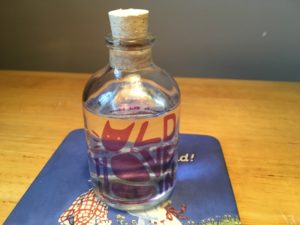 Now, you probably know about Brighton Gin, but have you heard about Old Hove Gin? Well thanks to the Old Albion pub in Hove, we have a new contender for our favourite seaside gin. Working with Sussex based Blackdown Distillery, they make it with local silver birch syrup (because that’s a thing) and serve it exclusively at the Old Albion pub. The gin uses a wheat grain as a base spirit and is blended with Sussex spring water from below the distillery before being charcoal filtered – plus it’s gluten free and suitable for vegetarians and vegans. So basically it’s a super food.
Now, you probably know about Brighton Gin, but have you heard about Old Hove Gin? Well thanks to the Old Albion pub in Hove, we have a new contender for our favourite seaside gin. Working with Sussex based Blackdown Distillery, they make it with local silver birch syrup (because that’s a thing) and serve it exclusively at the Old Albion pub. The gin uses a wheat grain as a base spirit and is blended with Sussex spring water from below the distillery before being charcoal filtered – plus it’s gluten free and suitable for vegetarians and vegans. So basically it’s a super food.
The Duchess
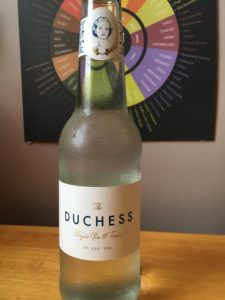 The Duchess is a brand of non-alcoholic gin and tonic. I know right? That makes no sense. It’s not just alcohol free – it’s also sugar free. Created for the “conscious consumer”, The Duchess blends re-distilled juniper berries with botanically infused tonic water. Basically it tastes like a gin and tonic thanks to the juniper and orange peel, all spice, cardamom and cloves. The important questions are: 1) is it any good and 2) does it taste like gin?
The Duchess is a brand of non-alcoholic gin and tonic. I know right? That makes no sense. It’s not just alcohol free – it’s also sugar free. Created for the “conscious consumer”, The Duchess blends re-distilled juniper berries with botanically infused tonic water. Basically it tastes like a gin and tonic thanks to the juniper and orange peel, all spice, cardamom and cloves. The important questions are: 1) is it any good and 2) does it taste like gin?
Tiger Gin
Note: I met Tiger Gin at Imbibe Live and they were kind enough to send me a sample for the blog.
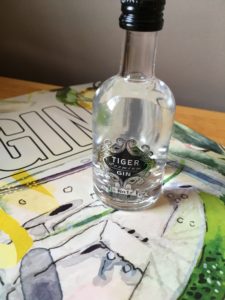 Tiger Gin is the product of JJ Lawrence (who starts emails with “Hi Tiger” FYI), a Shropshire lad with a passion for gin. He did what we all have thought about doing – wouldn’t be be awesome to make my own gin? And, well, he did it. What followed was a lengthy court battle against a global brand (Tiger beer familiar?) to be able to use the name, but finally Tiger Gin arrived. Using botanicals such as juniper (from the Balkans), coriander seeds (Eastern Europe), dried sweet lemon peel (Spain), cassia bark (China), nutmeg (West Indies), cinnamon bark (Madagascar) and two secret ingredients all blended with 100% grain spirit and pure English water, this gin is a global product.
Tiger Gin is the product of JJ Lawrence (who starts emails with “Hi Tiger” FYI), a Shropshire lad with a passion for gin. He did what we all have thought about doing – wouldn’t be be awesome to make my own gin? And, well, he did it. What followed was a lengthy court battle against a global brand (Tiger beer familiar?) to be able to use the name, but finally Tiger Gin arrived. Using botanicals such as juniper (from the Balkans), coriander seeds (Eastern Europe), dried sweet lemon peel (Spain), cassia bark (China), nutmeg (West Indies), cinnamon bark (Madagascar) and two secret ingredients all blended with 100% grain spirit and pure English water, this gin is a global product.
Bedrock Gin
Note: I met Bedrock Gin at Imbibe Live and they were kind enough to give me a sample for the blog.
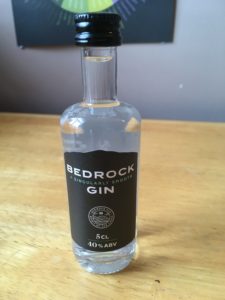 Bedrock Gin are not a new brand, as I found out at Imbibe Live. They have been going for nine years from the Cumbrian Lake District. Founder Vince Wilkins was inspired by the beauty of the Lake District, and working with a master distiller blended his botanicals with Cumbrian kiln-dried oak bark thus making Bedrock Gin. Winning silver at the IWSC in 2012 and 2013, they won gold in 2016 – winning plenty of other awards along the way. Made with 11 botanicals including citrus peel, liquorice and cinnamon, they suggest serving Bedrock with a slice of lime and a garnish of basil.
Bedrock Gin are not a new brand, as I found out at Imbibe Live. They have been going for nine years from the Cumbrian Lake District. Founder Vince Wilkins was inspired by the beauty of the Lake District, and working with a master distiller blended his botanicals with Cumbrian kiln-dried oak bark thus making Bedrock Gin. Winning silver at the IWSC in 2012 and 2013, they won gold in 2016 – winning plenty of other awards along the way. Made with 11 botanicals including citrus peel, liquorice and cinnamon, they suggest serving Bedrock with a slice of lime and a garnish of basil.
Clover Gin
Note: I met Clover gin at Imbibe Live and they were kind enough to give me a sample for the blog.
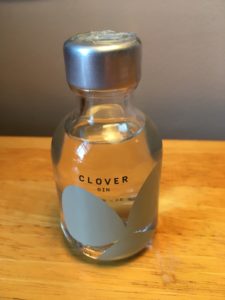
Clover gin hail from Belgium and have a lovely bottle. That’s kind of why I got chatting to them at Imbibe. A soft round bottle with a simple design – it’s a winner. The product of an eight month journey for three sisters, the gin features coriander, juniper and cardamom as a base, topped with pear and lavender for a perfumed finish. The secret ingredient? Clover (get it? from the name). Like the three sisters, the three leaved clover adds something unique to this gin. They suggest the perfect serve comes with fresh coriander leaves and a slice of ginger.
One Gin
Note: I met One Gin at Imbibe Live and they were kind enough to give me a sample to try for my blog.
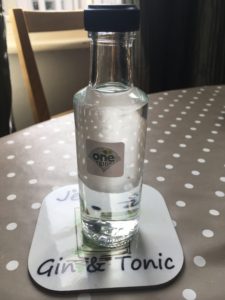 One Gin is produced by multi-award winning master distiller Sarah Thompson (a local gal from Blackdown spirits in Sussex). As a brand, they’ve been selling water and soft drinks since 2005 – if you haven’t heard of One Drinks before, they put some of their profits into helping the 663 million people around the world that don’t have access to clean drinking water. Over 2 million people die every year from a waterborne diseases and thousands more – usually women – are trapped in a cycle of needing to walk miles to the nearest clean water supply. One “Sage” Gin uses 9 botanicals which are distilled in a London Dry style, then the gin is further distilled with their signature fresh sage, foraged from the distillery’s grounds. One Gin have the aim of raising £20 million for water projects by 2020, so if you like your gin to have an ethical mission, then this is the one for you.
One Gin is produced by multi-award winning master distiller Sarah Thompson (a local gal from Blackdown spirits in Sussex). As a brand, they’ve been selling water and soft drinks since 2005 – if you haven’t heard of One Drinks before, they put some of their profits into helping the 663 million people around the world that don’t have access to clean drinking water. Over 2 million people die every year from a waterborne diseases and thousands more – usually women – are trapped in a cycle of needing to walk miles to the nearest clean water supply. One “Sage” Gin uses 9 botanicals which are distilled in a London Dry style, then the gin is further distilled with their signature fresh sage, foraged from the distillery’s grounds. One Gin have the aim of raising £20 million for water projects by 2020, so if you like your gin to have an ethical mission, then this is the one for you.
Wicked Wolf Gin
Note: I emailed Wicked Wolf gin and they kindly sent me a sample for the blog. As usual, you’ll know if it’s not quite the one for me.
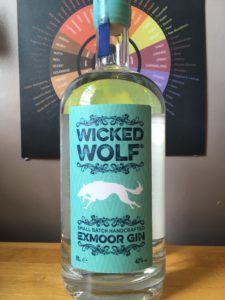 Wicked Wolf gin hails from Exmoor; using 11 botanicals the gin is distilled on the banks of the River Lyn by husband and wife team Pat Patel and Julie Heap. Made in a copper still, the gin is blended, filtered, bottled and labelled by hand in 100 litre batches. The gin is bottled at 42% and features traditional botanicals juniper, coriander seeds and cardamom pods with the more exotic kaffir lime leaves, lemongrass and hibiscus. Currently, unless you live in the Devon/Somerset area it’s a bit tricky to find in a pub or shop (although you can find it in Twenty One Wines in the Laines, Brightoners), but it is available online.
Wicked Wolf gin hails from Exmoor; using 11 botanicals the gin is distilled on the banks of the River Lyn by husband and wife team Pat Patel and Julie Heap. Made in a copper still, the gin is blended, filtered, bottled and labelled by hand in 100 litre batches. The gin is bottled at 42% and features traditional botanicals juniper, coriander seeds and cardamom pods with the more exotic kaffir lime leaves, lemongrass and hibiscus. Currently, unless you live in the Devon/Somerset area it’s a bit tricky to find in a pub or shop (although you can find it in Twenty One Wines in the Laines, Brightoners), but it is available online.
Kelso Gin Company
Note: I contacted the Kelson Gin Company and kindly sent me THREE samples of their gins. As always, you’ll know if I don’t like them.
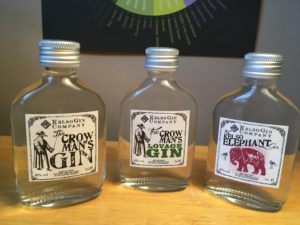 The Kelso Gin Company brings us the first gin from the Scottish Borders. Well, technically they make three gins. Because why start small? Oh, and as well as three gins they also have a vodka and reiver spirit too. Two of their gins are named after The Crow Man – a travelling medicine man who toured the Borders offering “little brighteners” to restore men and soothe women with his mix of secret ingredients. Using organic pure grain and distilled in Kelso, their exact ingredient list is a closely guarded secret (which should make tasting them fun) but the ones they’ll allow us to know include Love Parsely (aka Lovage), juniper and rowan. I have three gins: Crow Man’s Gin (classic juniper with cinnamon, angelica and more), The Kelso Elephant Gin (strong on flavour and using orient spices) and the Lovage Gin (intriguing and fresh).
The Kelso Gin Company brings us the first gin from the Scottish Borders. Well, technically they make three gins. Because why start small? Oh, and as well as three gins they also have a vodka and reiver spirit too. Two of their gins are named after The Crow Man – a travelling medicine man who toured the Borders offering “little brighteners” to restore men and soothe women with his mix of secret ingredients. Using organic pure grain and distilled in Kelso, their exact ingredient list is a closely guarded secret (which should make tasting them fun) but the ones they’ll allow us to know include Love Parsely (aka Lovage), juniper and rowan. I have three gins: Crow Man’s Gin (classic juniper with cinnamon, angelica and more), The Kelso Elephant Gin (strong on flavour and using orient spices) and the Lovage Gin (intriguing and fresh).
Kirkjuvagr Gin
Note: I contacted the Orkney Distillery and they kindly sent me a sample. As always, I’ll let you know if I don’t like it.
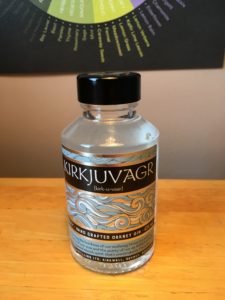 Kirkjuvagr gin comes from the Orkney Distillery – and FYI, is pronounced “kirk-u-vaar”. Kirkuvagr means “church bay” in Old Norse and evolved to be Kirkwall, the island’s capital. The gin is a reflection of the island’s history and the boldness of their ancestors, making a contemporary gin using old ingredients. Angelica grows wild on the island, which is blended with Ramanas Rose, Burnet Rose and Borage and Orkney barley. Distilled in small batches in copper stills, they channel their Norse heritage into every bottle they make.
Kirkjuvagr gin comes from the Orkney Distillery – and FYI, is pronounced “kirk-u-vaar”. Kirkuvagr means “church bay” in Old Norse and evolved to be Kirkwall, the island’s capital. The gin is a reflection of the island’s history and the boldness of their ancestors, making a contemporary gin using old ingredients. Angelica grows wild on the island, which is blended with Ramanas Rose, Burnet Rose and Borage and Orkney barley. Distilled in small batches in copper stills, they channel their Norse heritage into every bottle they make.